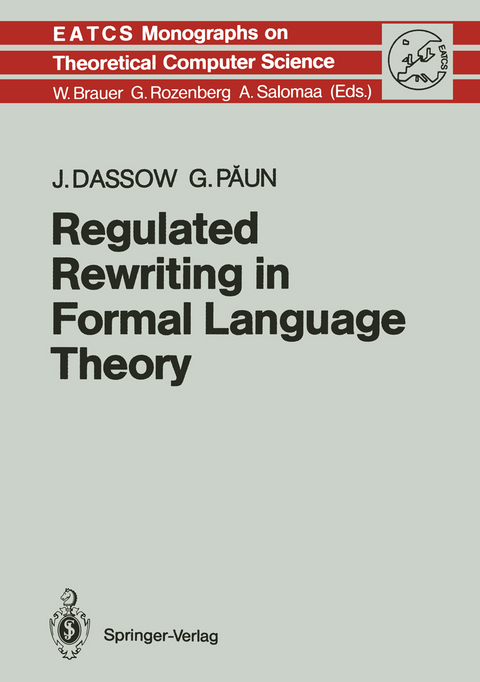
Regulated Rewriting in Formal Language Theory
Springer Berlin (Verlag)
978-3-642-74934-6 (ISBN)
0. Introduction.- 0.1. Languages and Language Families.- 0.2. Language Generating Devices.- 0.3. Algorithms and Decidability.- 0.4. Seven Circumstances Where Context-Free Grammars Are Not Enough.- 1. Three Types of Regulation: Matrix, Programmed, and Random Context Grammars.- 1.1. Definitions and Examples.- 1.2. The Generative Capacity.- 1.3. Fundamental Properties.- 1.4. Leftmost Derivations.- 1.5. Special Cases.- 2. Other Grammars with Regulation.- 2.1. Prescribed Sequences.- 2.2. Dependence on Previous Productions.- 2.3. Context Conditions.- 2.4. Further Regulated Devices.- 2.5. Conclusions.- 3. Grammars of Finite Index.- 3.1. The Generative Power of Finite Index Grammars.- 3.2. Properties of Grammars and Languages of Finite Index.- 4. The Syntactic Complexity of Regulated Rewriting.- 4.1. Nonterminal Complexity. Comparison.- 4.2. Nonterminal Complexity. Families of Languages with Bounded Complexity.- 4.3. Further Complexity Measures.- 5. Pure Regulated Grammars and Languages and Their Codings.- 5.1. Hierarchy of Pure Regulated Languages.- 5.2. Codings of Pure Languages.- 6. Combined Regulations.- 6.1. Indian and Russian Parallel Versions of Regulated Grammars.- 6.2. Ordered Versions of Regulated Rewriting.- 6.3. Random Context Versions of Regulated Grammars.- 7. Some Special Problems.- 7.1. Automata Characterizations.- 7.2. Szilard Language of Regulated Grammars.- 7.3. Grammar Forms.- 8. Regulated L Systems.- 9. Applications of Regulated Rewritting.- 9.1. Relationships with Programming Languages.- 9.2. Regulated Rewritting and Petri Nets.- 9.3. Modelling of Economic Processes.- 9.4. Modelling Folklore Fairy-Tales, Dramatic, Musical and Visual Art Works.- 9.5. The Mappings Investigation.- 10. A Common Generalization: Selective Substitution Grammars.- Notation Index.-Author Index.
| Erscheint lt. Verlag | 13.12.2011 |
|---|---|
| Reihe/Serie | Monographs in Theoretical Computer Science. An EATCS Series |
| Zusatzinfo | 308 p. |
| Verlagsort | Berlin |
| Sprache | englisch |
| Maße | 170 x 242 mm |
| Gewicht | 536 g |
| Themenwelt | Informatik ► Software Entwicklung ► User Interfaces (HCI) |
| Mathematik / Informatik ► Informatik ► Theorie / Studium | |
| Schlagworte | Automata Theory • Automatentheorie • Complexity theory • Komplexitätstheorie • Natural Language Processing • Natürlichsprachliche Systeme • Produktionssysteme • Regulated Grammars • Regulierte Grammatiken • Rewriting Systems |
| ISBN-10 | 3-642-74934-8 / 3642749348 |
| ISBN-13 | 978-3-642-74934-6 / 9783642749346 |
| Zustand | Neuware |
| Informationen gemäß Produktsicherheitsverordnung (GPSR) | |
| Haben Sie eine Frage zum Produkt? |
aus dem Bereich


